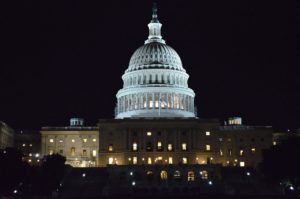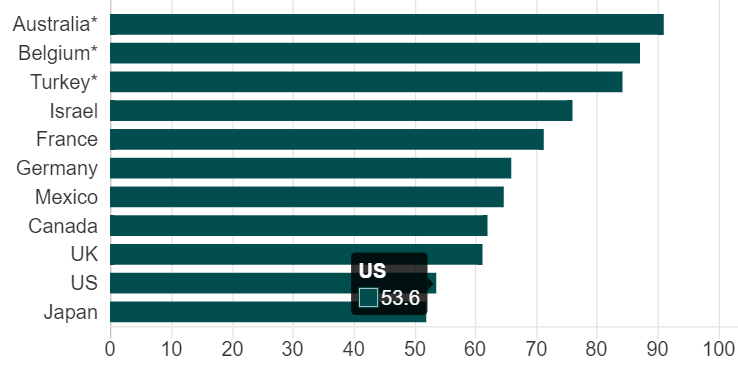Technocracy is a system of government where leadership is comprised – primarily, at least – of technical experts: Experts in specific fields who also have bureaucratic experience, as opposed to officials elected solely by the will of the people, or who have been appointed by politicians.
The United States looked fairly technocratic when it was first founded: Thomas Jefferson and Benjamin Franklin, for example, were both renowned inventors, and much emphasis was placed on intellect.
Though, as the U.S. has seemingly strayed far from the merits of technocracy –
The argument is that officials without background in the agencies they are running, or without expertise in any field for that matter, is the key issue that must be addressed if we are to make our government more effective. Out of 535 members of Congress, only six are engineers, one is a physicist, and there is actually a higher number of musicians, accountants, and former entertainers among the ranks.
Even of President Obama’s 23 cabinet members, only the Secretary of Energy and the Administrator of the Environmental Protection Agency had engineering or natural science backgrounds. The vast majority of the rest were… lawyers, and with a major sway on the side of corporate law, which might explain why none of the men responsible for the 2008 recession were actually punished, and why the majority of the wealth recuperated from the recession went to capitalists, and not the workers hurting most.
Understanding Technocracy
The idea is that the experts run the show – those with experience in the fields over which they’re making decisions.
This, in theory at least, removes political agendas from the equation, and it removes (however controversially) the need for anything other than proof and fact when making decisions about the future of our country.
It means the bible no longer plays a role in reproductive rights, for example.
At it’s core, though, it’s simply a respect for knowledge and skill. An understanding that technocracy is about the people who have dedicated their lives to a certain subject, and are therefore most qualified to make decisions necessary in the administration.
The Senate confirmation hearings on President-Elect Trump’s cabinet picks are an indication of why more emphasis should be placed on expertise. Trump’s pick for Education Secretary, Betsy DeVos, for example is clearly uninformed about, well, the state of education (video below). It was contributions made to the GOP that landed her the position, and it shows.
In a technocracy, ideally at least, this wouldn’t happen. Each person working in a government position would have not only a strong background in the position (and a certain level of competency), but also a proven track record of success – as almost every other job in the country requires.
It would not be based solely on political party, lobby, or connections. No longer would candidates be able to buy their way into a government position, and no longer would elections be based upon a better haircut or better smile, whether or not they’d be fun to drink a beer with, or because they’ve paid their dues to the powers that be.
Though Donald Trump and MAGA –
Clearly Donald Trump in power is a rejection of all things technocrat?
Not necessarily.
Yes, these Far-Right politicians do not surround themselves with people who could ever be called technocrats. He has created a cabinet full of people who are either well-connected personally or with business interests, or who have used their stature, not their background or their experience, to gain position in government.
But we should not confuse the rise of Donald Trump, and his rejection of intellectualism, with a rejection of technocrats or a rejection of expertise. While a large portion of the country was turned off by the “elitism” that Hilary Clinton et al. were perceived to embody, technocrats and elites are two different things.
Donald Trump was elected on a platform of populism and anti-elitism, but as Parag Khanna, author of Technocracy in America, said in a recent interview with Ozy,
“If “elite” and “technocrat” meant the same thing, we wouldn’t need two different words. It’s a great disservice to the word “technocrat” to confuse it with everyone who went to law school. Merely being a smart person with a pedigree doesn’t make you a technocrat. You need to have run something like a state or federal agency. Technocrats aren’t just smart people, they know how to effectively administer government. Barack Obama, for instance, was not a technocrat; he managed nothing in his career, and then he was in charge of the entire federal government.”
The idea is that we have, for too long, had less-than-qualified individuals running the nation’s largest governmental agencies. Furthermore, appointees, chosen at the whim of the President-Elect, change with every new regime. With technocracy, positions would be filled by those best suited, no matter who is in charge.
American Democracy Never Was
That’s a pretty dire outlook for the system of government that the United States has used for over 200 years.
Let’s look at the state of democracy in the United States: It would be an understatement to say that there has been a certain level of apathy among eligible votes – Turnout on election day is extremely low in the U.S., especially compared to other developed countries, and it’s been stagnant for almost 100 years.
A growing number of people are displeased with the government, and the handling of government programs, as evidenced in Beyond Distrust: How Americans View Their Government. And some believe, as Winston Churchill did,
“Many forms of Government have been tried, and will be tried in this world of sin and woe. No one pretends that democracy is perfect or all-wise. Indeed it has been said that democracy is the worst form of Government except all those other forms that have been tried from time to time.”
It’s not far fetched to say that democracy is no longer thriving. And perhaps the better question is, especially with the current state of government, can democracy thrive in America?
Some might call the current system a financial oligarchy, given the level of monetary, lobbyist, and big business involvement in elections and policy. We call ourselves a democracy, but on paper the U.S. is a democratic republic: We don’t vote directly on the laws that govern us; we vote for (often unqualified) officials to represent us.
But as was the case in the 2000 and 2016 presidential elections, where the candidate who received the most votes did not win the presidency, the vote of the individual doesn’t always seem to matter. And when the subsequent President-Elect begins to stock his cabinet full of golfing buddies and big money glad-handers, it’s easy for the disenchantment with the system to grow. Perhaps a dose of technocracy would inspire confidence anew.
Read this next: The Philosopher and the Party



